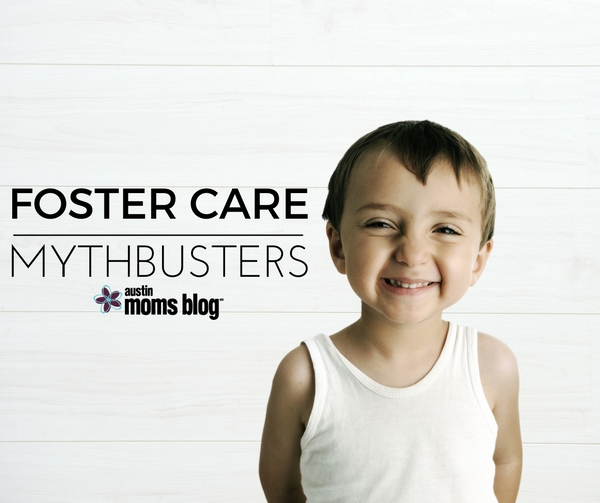
Foster care has been in the news a lot lately – for good and bad reasons. The truth is, foster care is an amazing opportunity to ensure all kids can have stable and loving homes. Being a foster parent can be a rewarding experience, but it isn’t without it’s challenges.
First, what is foster care?
Children come into foster care for a variety of reasons, often as a result of an event or series of events that make staying at home not possible. Foster care can be provided in the home of a relative to the child, a foster family home, a group home or in an institution that provides special needs, such as therapy and treatment. The placement can be short term or long term, depending on the child’s needs.
There are a lot of myths surrounding foster care, and here we break some of those down for you.
Myth: Children in foster care have severe mental, physical and / or emotional issues.
Fact: Children are resilient. While many kids in foster care have experienced traumatic experiences, such as neglect or abuse, they are not beyond help. With the care and support of a stable foster parent, they can thrive and overcome. In fact, oftentimes the support the youth needs to begin healing is best found within the context of a supportive family relationship – it can be the key component to helping them thrive.
Also, foster youth and the families caring for them have many benefits and resources available to help address their physical and emotional needs. The foster family isn’t doing it alone.
Myth: All children in foster care will have special needs and require additional supports.
Fact: Children in foster care are regular kids who unfortunately were taken away from their home as a result of an event or series of events, such as abuse or neglect. As a result, these children may need additional supports. However, not all children do. There are supports and services provided to all foster youth and the families caring for them and most of them are covered at no cost to the foster family. A Child Placing Agency or the Department of Family and Protective Services will walk you through all the services available. They can help you to identify the ones that will best address the unique needs of the child in your care. And, more importantly, all kids have the ability to overcome and with a safe, stable and supportive environment, they can thrive!
Myth: Most children in foster care are teenagers.
Fact: Children in foster care vary in age with a median age of about 8 years old and ages ranging from 0 to 17. It is true that the age in greatest need is typically between the ages of 11 and 17. You do have the opportunity to specify what ages would be the best fit for you and your home and that specification is honored and respected by the Department of Family and Protective Services. Even though the greatest need is for families or individuals wiling to foster older youth, children of all ages come into care and all need a supportive home.
Myth: Only married, heterosexual parents can foster children.
Fact: According to the Texas Department of Family and Protective Services, anyone who meets the following is eligible to foster:
The prospective foster/adoptive parents may be single or married and must:
- be at least 21 years of age, financially stable, and responsible mature adults,
- complete an application (staff will assist you, if you prefer),
- share information regarding their background and lifestyle,
- provide relative and non-relative references,
- show proof of marriage and/or divorce (if applicable),
- agree to a home study which includes visits with all household members,
- allow staff to complete a criminal history background check and an abuse/neglect check on all adults in the household, and
- attend free training to learn about issues of abused and neglected children.
Myth: I’m too old to be a foster parent.
Fact: As long as you meet the criteria above, and you are over 21, you are never too old to foster!
Myth: I work full-time outside of the home and that excludes me from fostering children.
Fact: You don’t have to be a stay-at-home parent to foster kids. Most parents who choose to work outside of the home can continue to do so. You are responsible for their care, however, while you are at work, for example placing them in daycare or at school. Support for childcare is provided through the state most of the time.
Many employers have policies that allow foster parents to leverage sick and other types of leave in the same way they would to care for a biological child. Some even have special leave to accommodate needs unique to foster parents. Check with your employer to determine what is available to you.
Myth: Fostering kids is expensive.
Fact: Each foster parent or family will receive financial assistance from the state to cover food, clothing and any medical needs, including counseling and dental. In addition, the reimbursement is based on the needs of the child; therefore, a child with higher needs will receive a higher reimbursement rate. This level of need is reevaluated throughout the fostering process. They want to ensure that the needs of the child are being met.
Myth: I need parenting experience before I can foster children.
Fact: You do not need to be a parent already to be a foster parent. However, you do need to complete training and prove that you have stable housing and can provide adequate care to the child.
Myth: I can’t pick which children I foster.
Fact: This is only partially true. While you cannot pick each child specifically, you can specify the age and gender you prefer. The state will respect your preferences. When you are called about a potential placement of a child, you always have the option of saying no if you don’t feel you can provide adequate care and support to the specific child or group of siblings.
Myth: The state offers no support to foster parents.
Fact: Every foster parent receives financial support to cover the cost of food and clothing, as well as any medical costs, including dental and mental health services. In addition, the state offers training opportunities geared to assist and prepare families. Various support programs, such as Women, Infant, and Children (WIC) and childcare subsidies, are available to families throughout the fostering process, including childcare and other state benefits.
Myth: I cannot adopt the children I foster.
Fact: Foster families can adopt! In many situations, reunification with the birth family is the goal; however, when termination of parental rights is in the best interest of the child, the foster parents who have cared for the children will be given the first opportunities to adopt.
Finally, it is important to know what the responsibilities are before a foster parent. Each parent is responsible to:
- provide daily care and nurturing of children in foster care;
- advocate for children in their schools and communities;
- inform the children’s caseworkers about adjustments to the home, school, and community, as well as any problems that may arise. They may include any serious illnesses, accidents, or serious occurrences involving the foster children or their own families;
- make efforts as team members with children’s caseworkers towards reunifying children with their birth families;
- provide a positive role model to birth families and
- help children learn life skills.
You will need to get licensed to be a foster parent. This can be done through either the Department of Family Protective Services or through a Child Placing Agency.
To learn more about how to become a foster parent in Texas, go to the Texas Department of Family and Protective Services (DFPS) Adoption and Foster Care page. Here you will learn all about the steps needed, including relevant training. DFPS also offers free information meetings across the state, click here to find one near you.
Also, check with Child Placing Agencies in your community. They offer additional supports and services that might be helpful. You can find Child Placing Agencies here.










Good post.